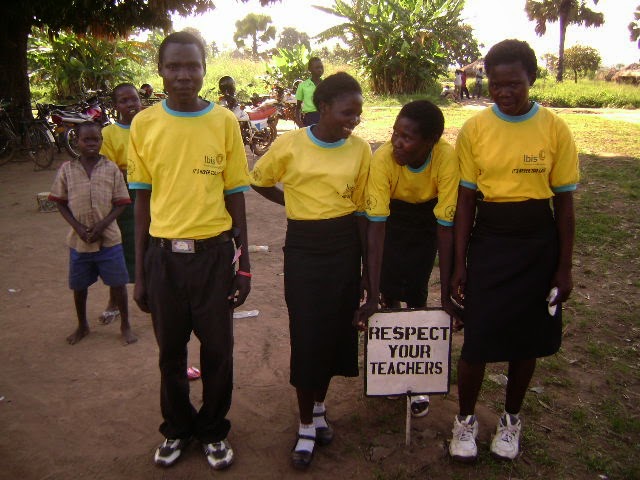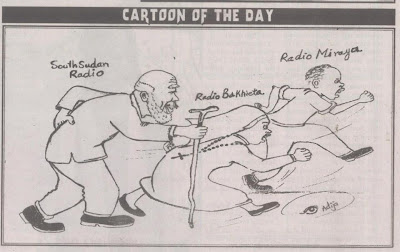Last month I have been in Northern Bahr El
Ghazal State, in the north-west of South Sudan, where IBIS is currently
implementing the EU funded ‘Poverty Reduction through Improved Access to
Education’ project which focuses on community, government and civil society
engagement in education while providing access to functional literacy to children,
youth and women. The main reason of my visit was to discuss with the Ministry of
Education, Science and Technology of the State, possibility of expansion of
IBIS in the area since it is good practice to involve the government officials
from the very onset of new projects’ design, not only to obtain their approval
but also to receive their inputs on approaches to utilize, advices on the
locations where to work, recommendations about specific activities to
implement. Christopher Athian Door, the Deputy Director of the Alternative Education
System (AES), a Directorate established in 2002 to provide educational opportunities to children, youth and adults
affected by the war through a series of alternative education programmes which meet
their various learning needs, was instrumental into describing as all the seven
components of the AES work in the State. Santino Ajiing Riing, AES Inspector,
was particularly good at explaining as one of them, the Community Girls School (CGS)
programme provides quality basic education for girls aged 8-12 in villages that
have no schools. Gino Aguer Aguer, Coordinator of the National Languages
Department, was passionate about the benefit of mother tongue as language of
instruction in increasing the literacy rate, which is to date only 27%, in a
country where the national language has been changed from Arabic to English
after Independence on July 9 2011. All of them were particularly excited about
the nomination of the new Minister, by the name of Valentino, who “does not
sit in the office all day long, but moves from one side to the other of the
state, to get to know the status of the school structures, the attendance rate
of the learners, the performance of the teachers”.
 It is not the first
time that I heard about a Valentino from Northern Bahr El Ghazal. Exactly 3 years ago, when I came to South
Sudan for the first time, I read, as many other foreigners eager to grasp a bit
of the dramatic story of this country, the book ‘What is the what?’ by Dave
Eggers, who narrates the story of Valentino Achak Deng, one of the many lost
boys of South Sudan who was resettled to the United States after so many years
as refugee in Kakuma during the second Sudanese Civil War (1983-2005). You
can’t imagine my surprise when I set up a meeting with the Minister, and there
he was Valentino, the same Valentino of the book, who was appointed Minister of
Education of the state where he comes from, only 5 weeks ago! It was really
quite emotional to meet someone who has walked (literally) such a long way and
has come back to his own country to contribute to its reconstruction and
development. During our discussion, Valentino was very supportive of IBIS, of
its present as of its future education programming in Northern Bahr El Ghazal
State, and was relentlessly taking notes of the areas of education we would
like to explore.
It is not the first
time that I heard about a Valentino from Northern Bahr El Ghazal. Exactly 3 years ago, when I came to South
Sudan for the first time, I read, as many other foreigners eager to grasp a bit
of the dramatic story of this country, the book ‘What is the what?’ by Dave
Eggers, who narrates the story of Valentino Achak Deng, one of the many lost
boys of South Sudan who was resettled to the United States after so many years
as refugee in Kakuma during the second Sudanese Civil War (1983-2005). You
can’t imagine my surprise when I set up a meeting with the Minister, and there
he was Valentino, the same Valentino of the book, who was appointed Minister of
Education of the state where he comes from, only 5 weeks ago! It was really
quite emotional to meet someone who has walked (literally) such a long way and
has come back to his own country to contribute to its reconstruction and
development. During our discussion, Valentino was very supportive of IBIS, of
its present as of its future education programming in Northern Bahr El Ghazal
State, and was relentlessly taking notes of the areas of education we would
like to explore.
There is no need to say that he made my day and I could not
refrain myself from asking to take a selfie together, the first I have ever
made, to crown an encounter which had the taste of grace.







.jpg)
.jpg)
.jpg)

.jpg)
.jpg)
.jpg)
.jpg)
.jpg)
.jpg)


